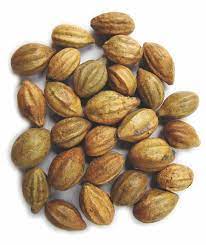Delhi
- GST NO. : 07AAHPG9824B1ZW
View Mobile Number
Terminalia Chebula (Harad, Chebulic myrobalan)

Biological Name:
Terminalia chebula
Family:
Combretaceae
Other Names:
Chebulic Myrobalan, Myrobalan Harra, Harad, Hirad, Jangalii harro, Katukka, Kadukka, Kadukkai, Kadukkaya, Kalidruma, Karkchettu, Nallakaraka, Alale, Alile, Anale, Anile, Karaka, Haritaki, Karedha, Ordo, Hilika, Kayastha, Reraw, Indian gall nut, Ink nut, Gall nut.
Habitat:
- The species is found mostly in mixed dry deciduous forests and is frequent in tropical and subtropical zones, mostly in hilly tracks.
- The plant prefers tropical environment, ascending in the sub-Himalayas zones up to an elevation of 1500 m.
- It is native to the Indian subcontinent and the adjacent areas such as Pakistan, Nepal and the south-west of China stretching as far south as Kerala or even Sri Lanka where is called Aralu.
Additional Info:
- The divine fruit characterizes five distinct tastes which are Katu (pungent), Tikta (bitter), Kashaya (astringent), Madhura and Amla Rasa (sour taste).
- It shows Laghu (light) and Rukshna (dry) gunas, Ushna Virya (hot potency) and Madhura Vipaka (sweet metabolic property).
- It is Tridoshic in nature i.e. balances all three doshas which are Vata (air), Pitta (fire and air) and Kapha (earth and water) doshas and hence balances and uplifts overall health
Elements Applied:
Dried immature fruits, generally the fruit rind.
Active Components:
- A number of glucosides have been isolated from haritaki, including the triterpenes arjunoglucoside I, arjungenin, and thechebuloside I and II.
- Other constituents include acoumarin conjugated with gallic acids called chebulin as well as other phenolic compounds including egallic acid, chebilinic acid, gallic acid, ethyl gallate, punicalagin,terflavin A & B, terchebin, luteolin, and tannic acid.
Used for:
- The harad fruit is antiseptic, diuretic, astringent, cardiotonic, and febrifuge in action.
- It is a safe and effective purgative, laxative, and alterative.
- It is an important ingredient of ‘triphala’, an Ayurvedic formulation used in the treatment of constipation, colic pain and kidney dysfunctions, eye diseases, and sore throat and skin diseases.
- Improves immunity.
- Also useful in weight loss.
- Unripe fruits are more purgative and the ripe ones are astringent.
Safety:
5-7 masha (5-7 grams)
Contact Us
Govind Madhav Herbal Tea
B-29-30, Delhi - 110064, India
Call Us : View Mobile Number
Phone : +91-11-45615006
E-mail : info@indianherbaltea.co.in

